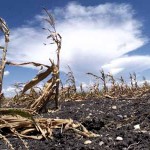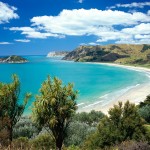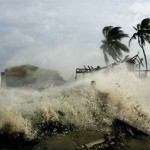A quarter of the world’s food crops are now being grown in regions that are highly water-stressed, according to a report released yesterday by the nonprofit World Resources Institute (WRI). It gets worse: Half the planet’s irrigated cropland, which produce 40% of the global food supply, is located in areas facing severe water shortages as climate change exacerbates drought.
Archive for the ‘Weather deterioration’ Category
For Insurers, No Doubts on Climate Change
Friday, June 7th, 2013If there were one American industry that would be particularly worried about climate change it would have to be insurance, right?
From Hurricane Sandy’s devastating blow to the Northeast to the protracted drought that hit the Midwest Corn Belt, natural catastrophes across the United States pounded insurers last year, generating$35 billion in privately insured property losses, $11 billion more than the average over the last decade.
And the industry expects the situation will get worse. “Numerous studies assume a rise in summer drought periods in North America in the future and an increasing probability of severe cyclones relatively far north along the U.S. East Coast in the long term,” said Peter Höppe, who heads Geo Risks Research at the reinsurance giant Munich Re. “The rise in sea level caused by climate change will further increase the risk of storm surge.” Most insurers, including the reinsurance companies that bear much of the ultimate risk in the industry, have little time for the arguments heard in some right-wing circles that climate change isn’t happening, and are quite comfortable with the scientific consensus that burning fossil fuels is the main culprit of global warming.
“Insurance is heavily dependent on scientific thought,” Frank Nutter, president of the Reinsurance Association of America, told me last week. “It is not as amenable to politicized scientific thought.”
– More… ➡
Secrets of the Rich
Tuesday, February 19th, 2013– Another brilliant piece by George Monbiot of the UK’s Guardian. I just cannot applaud him enough.
– dennis
————————————–
Billionaires are hiding behind a network of “independent” groups, who manipulate politics on their behalf.
Conspiracies against the public don’t get much uglier than this. As the Guardian revealed last week, two secretive organisations working for US billionaires have spent $118m to ensure that no action is taken to prevent manmade climate change(1). While inflicting untold suffering on the world’s people, their funders have used these opaque structures to ensure that their identities are never exposed.
The two organisations – the Donors’ Trust and the Donors’ Capital Fund – were set up as political funding channels for people handing over $1m or more. They have financed 102 organisations which either dismiss climate science or downplay the need to take action. The large number of recipients creates the impression that there are many independent voices challenging climate science. These groups, working through the media, mobilising gullible voters and lobbying politicians, helped to derail Obama’s cap and trade bill and the climate talks at Copenhagen. Now they’re seeking to prevent the US president from trying again(2).
This covers only part of the funding. In total, between 2002 and 2010 the two identity-laundering groups paid $311m to 480 organisations(3), most of which take positions of interest to the ultra-rich and the corporations they run: less tax, less regulation, a smaller public sector. Around a quarter of the money received by the rightwing opinion swarm comes from the two foundations(4). If this funding were not effective, it wouldn’t exist: the ultra-rich didn’t get that way by throwing their money around randomly. The organisations they support are those which advance their interests.
A small number of the funders have been exposed by researchers trawling through tax records. They include the billionaire Koch brothers (paying into the two groups through their Knowledge and Progress Fund) and the DeVos family (the billionaire owners of Amway)(5). More significantly, we now know a little more about the recipients. Many describe themselves as free market or conservative think tanks.
Among them are the American Enterprise Institute, the American Legislative Exchange Council, the Hudson Institute, Competitive Enterprise Institute, Reason Foundation, Heritage Foundation, Americans for Prosperity, Mont Pelerin Society and the Discovery Institute(6). All of them pose as learned societies, earnestly trying to determine the best interests of the public. The exposure of this funding reinforces the claim by David Frum, formerly a fellow of the American Enterprise Institute, that such groups “increasingly function as public-relations agencies”(7).
One name in particular jumped out at me: American Friends of the IEA. The Institute of Economic Affairs is a British group which, like all the others, calls itself a free market thinktank. Scarcely a day goes by on which its staff are not interviewed in the broadcast media, promoting the dreary old billionaires’ agenda: less tax for the rich, less help for the poor, less spending by the state, less regulation for business. In the first 13 days of February, its people were on the BBC ten times(8).
Never have I heard its claim to be an independent thinktank challenged by the BBC. When, in 2007, I called the institute a business lobby group, its then director-general responded, in a letter to the Guardian, that “we are independent of all business interests”(9). Oh yes?
The database, published by the Canadian site desmogblog.com, shows that American Friends of the IEA has received (up to 2010) $215,000 from the two secretive funds(10). When I spoke to the IEA’s fundraising manager, she confirmed that the sole purpose of American Friends is to raise money for the organisation in London(11). She agreed that the IEA has never disclosed the Donors’ Trust money it has received. She denied that the institute is a sockpuppet organisation: purporting to be independent while working for some very powerful US interests.
Would the BBC allow someone from Bell Pottinger to discuss an issue of concern to its sponsors without revealing the sponsors’ identity? No. So what’s the difference? What distinguishes an acknowledged public relations company taking money from a corporation or a billionaire from a so-called thinktank, funded by the same source to promote the same agenda?
The IEA is registered with the Charity Commission as an educational charity(12). The same goes for Nigel Lawson’s climate misinformation campaign (the Global Warming Policy Foundation(13)) and a host of other dubious “thinktanks”. I’ve said it before and I’ll say it again: it is outrageous that the Charity Commission allows organisations which engage in political lobbying and refuse to reveal their major funders to claim charitable status(14).
This is the new political frontier. Corporations and their owners have learnt not to show their hands. They tend to avoid the media, aware that they will damage their brands by being seen to promote the brutal agenda that furthers their interests. So they have learnt from the tobacco companies: stay hidden and pay other people to do it for you(15).
They need a network of independent-looking organisations which can produce plausible arguments in defence of their positions. Once the arguments have been developed, projecting them is easy. Most of the media are owned by billionaires, who are happy to promote the work of people funded by the same class(16). One of the few outlets they don’t own – the BBC – has been disgracefully incurious about the identity of those to whom it gives a platform.
By these means the ultra-rich come to dominate the political conversation, without declaring themselves(17,18). Those they employ are clever and well-trained. They have money their opponents can only dream of. They are skilled at rechannelling the public anger which might otherwise have been directed at their funders: the people who have tanked the economy, who use the living planet as their dustbin, who won’t pay their taxes and who demand that the poor must pay for the mistakes of the rich. Anger, thanks to the work of these hired hands, is instead aimed at the victims or opponents of the billionaires: people on benefits, the trade unions, Greenpeace, the American Civil Liberties Union.
The answer, as ever, is transparency. As the so-called thinktanks come to play an ever more important role in politics, we need to know who they are working for. Any group – whether the Institute of Economic Affairs or Friends of the Earth – which attempts to influence public life should declare all donations greater than £1000. We’ve had a glimpse of who’s paying. Now we need to see the rest of the story.
– To the original and its references: ➡
Worst U.S. drought in decades continues
Sunday, November 25th, 2012The worst US drought in decades has deepened again after more than a month of encouraging reports of slowly improving conditions, a drought-tracking consortium said today, as scientists struggled for an explanation other than a simple lack of rain.
While more than half of the continental US has been in a drought since summer, rain storms had appeared to be easing the situation week by week since late September. But that promising run ended with today’s weekly US Drought Monitor report, which showed increases in the portion of the country in drought and the severity of it.
The report showed that 60.1 per cent of the lower 48 states were in some form of drought as of Tuesday, up from 58.8 per cent the previous week. The amount of land in extreme or exceptional drought the two worst classifications increased from 18.3 per cent to 19.04 per cent.
The Drought Monitor’s map tells the story, with dark red blotches covering the center of the nation and portions of Texas and the Southeast as an indication of where conditions are the most intense. Those areas are surrounded by others in lesser stages of drought, with only the Northwest, Florida and a narrow band from New England south to Mississippi escaping.
– more… ➡
Global Warming and New Zealand
Monday, November 12th, 2012– The New Zealand Listener Magazine has an editorial in their September 22-28, 2012 edition entitled:
– It makes a lot of good points and I recomend reading it if you are a New Zealander.
– It repeats a point that I’ve made on this Blog for a long time. And that is that sooner or later, the same factors that brought me, and numerous other new immigrants to NZ, are going to become apparent to greater and greater numbers of folks and the rush to immigrate to NZ is going to be on.
– There will be, in the not too distant future, a lot of reasons to run away from other locations out in the world. Rising sea levels, water shortages, food shortages, extreme weather and widening social chaos will be among those factors. We’ve had economic and human rights refugees in the past. These will increase in the future and to their numbers will be added environmental refugees.
– Right now, NZ is not in bad shape.
– We generate the majority of our energy needs from benign sources such as hydroelectric and geothermal.
– We also generate two or more times the food that we consume which is why we can do a handsome amount of agricultural exporting.
– We are also protected from the worst of the weather changes because our climate is strongly buffered by the fact that we are an island nation in the midst of a huge surrounding ocean.
– We also have a fairly homogeneous culture which is good. It means that we, as a people, have fairly uniform ideas about how things should work.
– And, finally, we are protected from unwanted and forced immigration by that same ocean that surrounds us. Australia is the closest and they are 1000 miles away and most of the increasingly desperate world lies beyond them on the far side.
– But we will not remain in good shape if we don’t, as a nation, look out for ourselves.
– Should we let foreigners buy farmland here?
– The authors of the article think not and I agree with them. If push comes to shove in a nastier future and we need the food that grows here to survive, we will not be happy if a significant portion of it belongs to folks from overseas and they want to ship it home to their own people.
– Should we let offshore folks own significant portions of our industries and our means of production? I think not. If the world gets tough, they won’t be asking ‘how can they help us with those things’. They will be asking how those things can be used to help them.
– Should we let large numbers of folks immigrate into NZ from cultures significantly different from ours? Currently, we are not split, say, over common law verses Sharia Law or whether women should be first class citizens here or not. Or whether or not everyone should be able to practice their own religion so long as they leave other folks alone. But, if we don’t watch our immigration rates and types, this situation could get away from us. For a more detailed discussion of these ideas see here: ➡
– It is indeed sad that we might need to start thinking this way. Is seems so isolationist and selfish and New Zealand has always been a compassionate and generous nation.
– But, tough times are coming. The question is not ‘if‘ but simply ‘when‘. And the question is not, ‘is it going to be bad?‘. The fact is that it is going to be bad and the estimates of how bad it is going to be are only getting worse as we, as a world, keep continuing along without reacting to the dangers ahead.
– Please read the article.
– We in NZ are probably going to be some of the very luckiest people on the planet when the wheels come off because of our physical isolation, our low population, our excess food production capability and our well organized society. But those factors are not going to be enough to save us if we don’t look out for ourselves.
– The Arabs have an expression that comes to mind here: “Trust in God, but tether your camel.“
– dennis
– Late breaking: Chinese want to buy into Fonterra. See ➡
Climate change ‘grave threat’ to security and health
Wednesday, November 2nd, 2011Climate change poses “an immediate, growing and grave threat” to health and security around the world, according to an expert conference in London.
Officers in the UK military warned that the price of goods such as fuel is likely to rise as conflict provoked by climate change increases.
A statement from the meeting adds that humanitarian disasters will put more and more strain on military resources.
It asks governments to adopt ambitious targets for curbing greenhouse gases.
The annual UN climate conference opens in about six weeks’ time, and the doctors, academics and military experts represented at the meeting (held in the British Medical Association’s (BMA) headquarters)argue that developed and developing countries alike need to raise their game.
Scientific studies suggest that the most severe climate impacts will fall on the relatively poor countries of the tropics.
UK military experts pointed out that much of the world’s trade moves through such regions, with North America, Western Europe and China among the societies heavily dependent on oil and other imports.
Rear Admiral Neil Morisetti, climate and energy security envoy for the UK Ministry of Defence (MoD), said that conflict in such areas could make it more difficult and expensive to obtain goods on which countries such as Britain rely.
“If there are risks to the trade routes and other areas, then it’s food, it’s energy,” he told BBC News.
“The price of energy will go up – for us, it’s [the price of] petrol at the pumps – and goods made in southeast Asia, a lot of which we import.”
– More… ➡
Climate change evidence ‘undeniable’
Friday, July 15th, 2011Disastrous floods, heatwaves, storms and droughts are becoming more frequent because of climate change, and will continue to do so.
Scientists say the world can no longer ignore the link between climate change and extreme weather events, and they are urging countries to face up to the growing risks ahead.
New Zealander Kevin Trenberth, who heads the climate-analysis section at the National Center for Atmospheric Research in Colorado, said events of the past 18 months had been extraordinary. “It’s as clear a warning as we’re going to get about prospects for the future.”
Last year was the warmest on record and that warming was directly related to increases in carbon dioxide in the atmosphere, he said. It brought with it devastating floods in Pakistan and a heatwave in Russia, which resulted in riots around the world because of increased food prices.
Subsequent floods in Sri Lanka, Brazil and Queensland also brought deaths on a huge scale, and Dr Trenberth said scientists were now considering how such extreme events were linked.
Although some aspects of extreme weather were due to natural variation, global warming was now contributing too, with disastrous consequences. “There’s this 5-10 per cent contribution that may be thought of as the straw that breaks the camel’s back.”
The world would experience less snow and more rain, more floods, more heatwaves and consequent wildfires, and more storms featuring hurricanes and tornadoes.
Professor Lionel Carter, of Victoria University’s Antarctic Research Centre, said the effects were being seen on New Zealand’s doorstep, with the Tasman Sea getting warmer, and that warming shifting south.
Antarctica was losing mass, and the West Antarctic ice sheet in particular was causing concern as much of it was below sea level. A change to its mass could see the ice sheet lift off and raise the sea level by three to five metres.
This year was likely to be significant for extreme events such as floods, tornadoes and droughts, he said.
Dr Trenberth said increased temperatures had led to more water staying in the atmosphere. “What we are seeing throughout the world is when it rains, it pours.”
Over the oceans there was now 4 per cent more water vapour than in the 1970s, and sea surface temperatures had increased by about 0.55 degrees Celsius.
“The environment in which all storms form now is different to 30 or 40 years ago because of climate change.”
Professor Martin Manning, of Victoria’s Climate Change Research Institute, said humans were a primary driver for climate change, and the question now was how we dealt with the problem.
Insurance companies were beginning to recognise the trends in extreme weather and pay attention. “They’re getting extraordinarily concerned. They don’t really think what we’re doing at the moment is risk management.”
The world had “pushed way past” the point where local adaptations to climate change were going to be enough, as patterns of extreme events were too widespread. “We’re starting to see global risks being dealt with. It’s a global problem.”
– More… ➡
May was warmest on record – Niwa
Tuesday, May 31st, 2011– Here in New Zealand, this May was the warmest ever. I talked to a friend in central Washington State in the USA today, and she said that they’d just had the coldest May ever there.
= = = = = = = = = = = = = = = = = = =
Balmy temperatures and sub-tropical conditions saw New Zealand experience its warmest May on record, in a month that included floods, storms and a tornado.
Data from climate agency Niwa shows the month was almost 2.5 degrees Celcius warmer than usual, with rainfall double normal levels.
The figures won’t be official until tomorrow morning, but principal climate scientists James Renwick said the provisional numbers were extraordinary.
“Two-point-five degrees doesn’t sound like much, but for the average over the whole month that’s huge,” Renwick said.
“Normally 0.5 of a degree is a record-breaker.”
The average monthly temperature had been 13.1C, a temperature normally expected for April, Renwick said.
The previous hottest May, recorded in 2007, had a mean temperature of 12.4C.
Rainfall totals were also extreme, especially in the eastern Bay of Plenty and Nelson regions.
The rain gauge at Whakatane airport showed the region had experienced 2.5 times its normal rainfall, while at Nelson airport, 3.5 times the normal levels were recorded.
Both regions had suffered heavy flooding during May, with residents evacuated from their homes in coastal areas of the Bay of Plenty mid-month due to slips closing roads.
A number of Nelson homes were evacuated last week when rivers burst their banks and threatened to inundate homes.
– More… ➡



